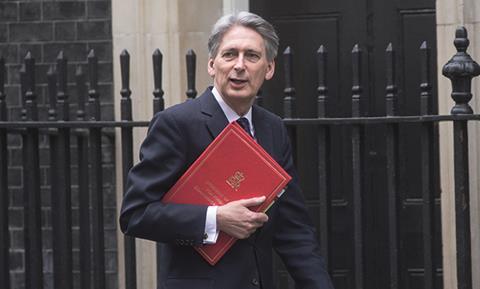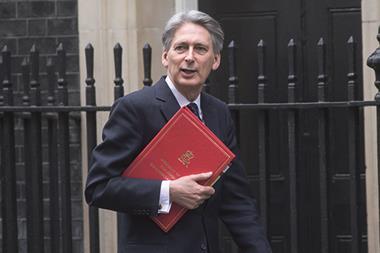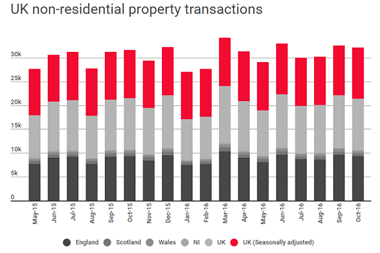The key planks of chancellor Philip Hammond’s Autumn Statement have been met with a wide range of reaction from the property sector.

Below, Property Week summarises the five key announcements alongside reaction from industry experts.
£2.3bn housing infrastructure fund
Hammond announced a new £2.3bn infrastructure fund that will enable the development of 100,000 new homes. The fund is intended to bankroll infrastructure projects in “high-demand” areas to “unlock” development, and will be paid from a larger £23bn pot aimed at boosting UK productivity.
- David Thomas, chief executive of Barratt Developments: “It’s good to see continued government focus on housing supply. We welcome the additional infrastructure funding to encourage growth in areas of high demand – it remains important that authorities in those areas plan positively for growth and bring forward land for new homes.”
- Inspired Homes chief executive Martin Skinner: “Real steps are needed to address the longstanding shortage of homes in the UK and the Government has now taken measures to inject some confidence into the industry in order to support the next generation of homeowners. It is vitally important that these new measures quickly filter to homebuilders so we can begin work.”
- Melanie Leech, chief executive of the British Property Federation: “This Budget’s hidden gem is the spending on infrastructure to help bring forward housing sites. Infrastructure spending is housing delivery’s silver bullet and the considerable commitment to invest about £2bn a year is therefore very welcome.”
- Conrad Payne, partner in national development at Strutt & Parker: “Whilst it is clear that the government has good intentions for delivering housing solutions across all tenures, the reality is that most of these initiatives will only deliver marginal gains without a fundamental retooling of planning departments within local authorities.”
£1.4bn to pay for affordable homes
The chancellor also confirmed the government would use a further £1.4bn to pay for 40,000 new affordable homes, and relax rules on government grants to allow developers to build a wider range of tenures.

- Marc Vlessing (pictured right), chief executive of affordable housing developer Pocket: “The government’s focus on affordable housing will help [people on moderate incomes] but this must include intermediate affordable housing options which can help them into homeownership. The government should ensure that today’s new funding is used to stimulate small and medium developers, like Pocket, to optimise the chances of delivering more affordable housing typologies using innovative techniques like modular construction.”
- Robert Grundy, head of housing, Savills: “The move marks a clear shift away from the previous government’s focus on homeownership. Together with a more flexible use of existing funding for affordable housing, will enable the delivery of a wider variety of housing tenure aimed a different parts of the market.”
- Adam Challis, head of residential research, JLL: “£1.4 billion is a drop in the ocean when it comes to the scale of housing need. The chancellors’ hands are tied with the deficit continuing to grow, but there is a huge wave of private sector money seeking to invest in Britain’s housing stock. He should aggressively be seeking out private partnerships - there is no time to waste.”
- Anthony Lee, joint head of residential advisory and consulting, BNP Paribas Real Estate: “The amount proposed is unlikely to achieve the delivery of 40,000 new rented homes that the government suggests. Before 2010 [grant funding] was typically provided at around £30,000 per bed space, or £130,000 for a three-bed unit. However, since that time, house prices in many parts of London have almost doubled, so any grant funding has to work harder to achieve the same outcome.”
- Russell Gardner, head of real estate at EY: “Measures to address the UK’s housing supply crisis are welcome, but must represent the start of a major commitment to building significantly more homes across the UK. The headline numbers are eye-catching but it requires a stretch of the imagination to believe that new homes supply can be unlocked for £23,000 each or an affordable house can be built for £35,000.”
Business rates package confirmed
Hammond confirmed that the government will push ahead with its £6.7bn planned changes to business rates despite strong industry opposition. The chancellor said that the maximum increase in rates through transitional relief - the system allowing rates changes to be phased in over a period of up to five years - will be reduced for large business with bills of more than £100,000, from 45% next year to 43%, and from 50% to 32% the year after.
- Ian Allison, business rates director at BNP Paribas Real Estate: “The ‘relief’ is indeed complicated, but the chancellor presented this bad news very well, by implying that the level of rates increases that many businesses are set to endure next year will be lower than expected. This is still bad news, albeit not quite as bad as feared.”
- Paul Easton, head of business rates at Lambert Smith Hampton: “Whilst business rate payers will welcome this very modest adjustment in the first year, it is hardly significant and more importantly there was no mention in the speech to the penal phasing in of reductions in business rate liabilities following the revaluation.”
- Miles Gibson, head of UK research at CBRE: “The chancellor disappointed business rate payers by only marginally cutting the maximum increase in bills next April from 45% to 43%, which businesses will find very difficult to swallow in a weaker trading environment.”
- Jerry Schurder, head of business rates, Gerald Eve: “The Chancellor’s flagship £6.7 billion business rates package is in fact no more than a repetition of his predecessor’s proposals, and falls a long way short of the far-reaching reforms businesses have been calling for.”

Ban on upfront letting fees
The government is banning letting agents’ fees levied on tenants. The decision will apply to 4.3 million private rental sector tenants in England, saving an estimated £337 in fees for each tenant.
- David Cox, managing director of the Association of Residential Letting Agents: “A ban on letting agent fees is a draconian measure, and will have a profoundly negative impact on the rental market. This decision is a crowd-pleaser, which will not help renters in the long-term. If fees are banned, these costs will be passed on to landlords, who will need to recoup the costs elsewhere, inevitably through higher rents.”
- Ian Thomas, co-founder of LendInvest: “Scrapping letting agency fees is surely at odds with the government’s goal to promoting a healthy rental market. Landlords will be squeezed from yet another angle, while many tenants will eventually foot the bill. The government cannot drive forward its strategy for productivity if it doesn’t create a mixed-tenure property market that’s truly fit for purpose.”
- Russel Quirk, chief executive of eMoov: “Today’s announcement on rental fees is nothing more than opportunistic tokenism and surprisingly is stolen straight from Labour’s manifesto. Interestingly the chancellor’s own housing minister, Gavin Barwell, described banning lettings fees as “a bad idea” as recently as September. It is ironic that the government should be turning its guns again on the private rental sector, given that the absence of government action in building affordable homes to rent in the social housing sector has led to private landlords having to fill the gap on their behalf.”
No change on stamp duty
The final ‘change’ was no change at all. There was no mention of stamp duty within the Autumn Statement, despite widespread industry calls to scrap the 3% surcharge on second homes that was introduced by former chancellor George Osborne last April.
- Ashley Osborne, head of UK residential at Colliers International: “We were not anticipating any significant alteration to stamp duty land tax as we believe that if the May government does change its view on the recent stamp duty amendments, it will keep its powder dry and make changes after Article 50 when the government will be looking for good news stories and policies to help stimulate the building industry.”
- Rory O’Neill, head of residential at Carter Jonas: “Stamp duty is the only negative stalling the market - even the attractiveness of the pound to dollar based buyers, affordable borrowing and pent up demand cannot overcome the crippling transactional costs of moving house. A reduction in stamp duty costs is the final catalyst that the market needs to boost transactions and we will lobby for this in the spring statement.”
- Martin Bellinger (pictured right), chief operating officer at Essential Living, said: “From day one, we’ve said that renters should not pay fees and it’s right that the government has acted to clamp down on this. However, we’re disappointed to not see the back of the stamp duty levy George Osborne promised to not apply to build to rent. This is a senseless tax that does nothing but hamper investment in new homes.”

- Robin Paterson, chief executive of Sotheby’s International Realty: “Osborne suggested these changes in a different climate, one unaffected by the global uncertainty 2016 has seen. Whilst some correction to pricing was needed, these corrections have certainly taken place and a kick start to the middle and high end London market is now necessary.”






























No comments yet